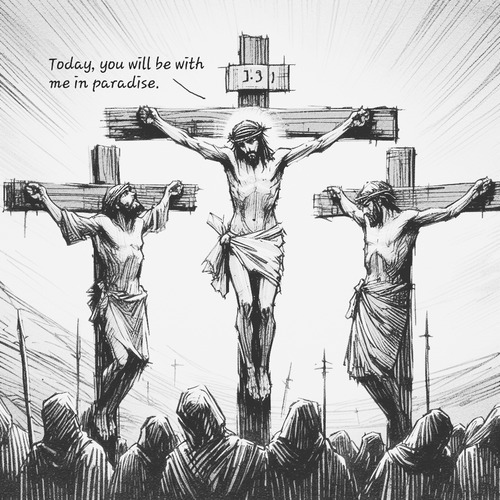‘Today You Will Be With Me in Paradise’: What Did Jesus Mean?
FROM OUR SERIES ON CHRIST’S SEVEN FINAL UTTERANCES FROM THE CROSS
Jesus spoke seven times from the cross, each utterance carrying great theological significance. His second statement—“Truly I tell you, today you will be with me in paradise” (Luke 23:43)—is one of the most hopeful and provocative declarations in Scripture. Spoken to a dying criminal in the midst of His own suffering, these words reveal the heart of Christ’s mission and the immediacy of salvation available even at life’s eleventh hour…
TODAY YOU WILL BE WITH ME IN PARADISE: THE BIBLICAL CONTEXT
In Luke’s account of the crucifixion, two criminals hang alongside Jesus. Initially, both join the crowd in mocking Him, but something remarkable happens. One criminal undergoes a profound change of heart:
“One of the criminals who hung there hurled insults at him: ‘Aren’t you the Messiah? Save yourself and us!’ But the other criminal rebuked him. ‘Don’t you fear God,’ he said, ‘since you are under the same sentence? We are punished justly, for we are getting what our deeds deserve. But this man has done nothing wrong.’ Then he said, ‘Jesus, remember me when you come into your kingdom.’” (Luke 23:39-42)
In this pivotal moment, Jesus responds with extraordinary grace: “Truly I tell you, today you will be with me in paradise” (Luke 23:43). This exchange, brief as it is, encapsulates the gospel message and provides a window into core Reformed doctrines.
THEOLOGICAL SIGNIFICANCE: A REFORMED PERSPECTIVE
Salvation by Grace Alone (Sola Gracia): The Reformed tradition emphasises salvation is God’s free gift, not something earned through human effort. The thief on the cross perfectly illustrates this principle. He brings nothing to Jesus but his sin, his dying breath, and his faith. John Calvin observed in his commentary on Luke: “This passage teaches us that salvation consists of nothing else than having our names written in the book of life.” The thief did no good works, performed no religious rituals, and had no opportunity for baptism or church membership. Yet Christ welcomes him into paradise.
Faith Alone (Sola Fide): The thief’s justification came through faith alone. His simple confession recognised three key truths: his own guilt (“we are getting what our deeds deserve”), Christ’s innocence (“this man has done nothing wrong”), and Jesus’ kingship (“when you come into your kingdom”). This confession demonstrates saving faith in its essence—acknowledging sin, recognising Christ’s perfection, and trusting His sovereign authority.
The Westminster Confession states, “Faith…is the alone instrument of justification” (11.2). The thief’s experience dramatically confirms this doctrine. Faith alone—not accompanied by works or ceremonies—secured his salvation.
Christ Alone (Solus Christus): Even while dying, Jesus exercises divine authority to grant salvation. This demonstrates He alone is the mediator between God and humanity. As the Heidelberg Catechism declares, “There is no other mediator than Christ” (Q&A 30). Jesus doesn’t suggest the thief pray to saints or endure purgatory—He personally guarantees the man’s salvation through direct relationship with Himself.
THE NATURE OF PARADISE
The word “paradise” (paradeisos) carries rich meaning. Originally a Persian term for an enclosed garden or royal park, it appears in the Greek translation of the Old Testament to describe the Garden of Eden. By Jesus’ time, it had become associated with the righteous dead’s dwelling place and the future restoration of creation.
In the Reformed tradition, paradise refers to the intermediate state where believers dwell consciously in Christ’s presence after death, awaiting the final resurrection. Jesus isn’t merely offering comfort—He’s promising immediate, conscious communion with Himself in the realm of the righteous dead.
This understanding refutes the doctrine of “soul sleep” (the belief that the soul is unconscious after death until the resurrection). Calvin firmly rejected this view: “Let us learn from this passage that souls, when they leave their bodies, remain alive.”
IMMEDIATE SALVATION: THE SIGNIFICANCE OF “TODAY”
Perhaps most striking is Jesus’ emphasis on “today.” Believers immediately enter Christ’s presence upon death, with no waiting period or purgatory. As the Westminster Confession states: “The souls of the righteous, being then made perfect in holiness, are received into the highest heavens, where they behold the face of God in light and glory, waiting for the full redemption of their bodies” (32.1).
The word “today” undermines purgatorial concepts, where souls must undergo purification before entering God’s presence. Instead, as Reformed theologian Louis Berkhof noted, “the souls of believers are at death made perfect in holiness and immediately pass into glory.”
TODAY YOU WILL BE WITH ME IN PARADISE: RADICAL GRACE
This account challenges our assumptions about who can be saved and when. The thief receives salvation at the last possible moment—the ultimate “deathbed conversion.” This shouldn’t encourage presumption about delayed repentance, but it does showcase the radical reach of God’s grace. No one is beyond redemption; no moment is too late for God’s saving work.
Remarkably, the thief becomes the first beneficiary of Christ’s atoning work, even before the crucifixion is complete. His salvation foreshadows the efficacy of Christ’s sacrifice for all who will believe.
APPLICATION FOR US TODAY
For Christians today, Jesus’ promise offers profound comfort. Death, while still an enemy, has lost its ultimate sting. For believers, it means immediate entrance into Christ’s presence—“absent from the body, present with the Lord” (2 Corinthians 5:8).
This truth should:
- Comfort those facing death or grieving loved ones
- Motivate urgent gospel witness, as eternity hangs in the balance
- Expand our vision of God’s grace, which reaches even the least likely candidates
- Strengthen our hope in Christ’s finished work, which secures our eternal fellowship with Him
CONCLUSION: TODAY YOU WILL BE WITH ME IN PARADISE
“Today you will be with me in paradise” is one of Scripture’s most comforting promises. In these few words, Jesus affirms salvation by grace through faith, the sufficiency of His mediation, the reality of conscious afterlife, and the immediacy of redemption.
For the repentant thief—and for believers throughout history—these words transform death from the ultimate tragedy into a doorway to Christ’s presence. As the Puritan Richard Baxter famously wrote, anticipating his own death: “When God calls me hence, it will be but a journey from the porch to the palace, from the suburbs to the city, from the noise to the music.”
TODAY YOU WILL BE WITH ME IN PARADISE: RELATED FAQs
How does Jesus’ promise to the thief relate to His descent into hell mentioned in the Apostles’ Creed? Reformed theologians typically understand Christ’s “descent into hell” not as a literal journey to hell but as His experience of God’s judgement on the cross. When Jesus promised paradise to the thief, He was affirming that both would bypass any notion of hell and enter directly into God’s presence. This demonstrates the completeness of Christ’s atoning work, finished on the cross with no further suffering required.
- Did Jesus contradict Himself when He told the thief “today you will be with me in paradise” but later told Mary Magdalene “I have not yet ascended to my Father” (John 20:17)? These statements address different spiritual realities and timeframes. “Paradise” in Luke 23:43 refers to the intermediate state where believers’ souls dwell with Christ after death, while “ascending to the Father” in John 20:17 refers to Christ’s bodily ascension to heaven after resurrection. Jesus’ soul was with the thief in paradise during the three days His body was in the tomb, but His bodily ascension to the Father’s right hand happened later.
- What implications does this passage have for the Reformed view of election and predestination? The thief’s last-minute conversion powerfully illustrates God’s sovereign election. Without any external influence, the Holy Spirit works in the thief’s heart to produce saving faith, demonstrating salvation is entirely God’s work. This aligns with the Reformed understanding that God chooses His elect according to His purpose alone, not based on foreseen merit or works.
- How does the promise to the thief relate to baptism in Reformed theology? While Reformed theology highly values baptism as a covenant sign, the thief’s salvation without baptism demonstrates that the sacrament, while ordinarily necessary, is not absolutely essential for salvation. Calvin used this passage to argue against those who made baptism an absolute requirement, writing that “God has it in his power to save without that symbol.” This maintains the Reformed balance between honouring God’s ordinary means of grace while acknowledging His sovereign freedom.
- What does the thief’s conversion tell us about the nature of true repentance? The thief displays all elements of genuine repentance: acknowledgment of personal guilt, confession of sin, defence of Christ’s honour, and turning to Jesus as Lord. His repentance wasn’t merely emotional remorse but involved a complete reorientation toward Christ. This serves as a model of authentic repentance that, however brief, demonstrates the transformed heart that saving faith produces.
- How does this passage inform the Reformed understanding of assurance of salvation? Jesus’ unconditional promise offers one of Scripture’s clearest examples of the assurance of salvation. The thief receives absolute certainty of his salvation directly from Christ, without any subsequent period of proving himself through works. This supports the Reformed teaching that assurance is possible in this life and comes primarily through faith in Christ’s promises rather than through our own works or feelings.
What does this passage teach us about criminal justice and redemption from a Reformed perspective? This passage demonstrates that no one, not even condemned criminals, is beyond spiritual redemption. While Reformed theology affirms the legitimacy of civil punishment (the thief acknowledges his punishment is just), it also maintains that God’s mercy transcends human justice. This suggests a Christian approach to criminal justice that upholds consequences while maintaining hope for spiritual transformation and eternal redemption.
TODAY YOU WILL BE WITH ME IN PARADISE: OUR RELATED POSTS
Editor's Pick

GPS Without Eyes: How Ants Silently Shout Intelligent Design
Picture a leafcutter ant navigating the rainforest floor in pitch darkness, carrying a leaf fragment 50 times its body weight. [...]

Born Broken: Why Must We Affirm Original Sin?
Imagine a world where we’re born neutral—free to choose good, and without a bias toward evil. Sounds appealing… until we [...]

Does God Truly Care About My Everyday Choices?
OWe believe God created the universe. We believe He orchestrated the exodus from Egypt and raised Jesus from the dead. [...]
SUPPORT US:
Feel the Holy Spirit's gentle nudge to partner with us?
Donate Online:
Account Name: TRUTHS TO DIE FOR FOUNDATION
Account Number: 10243565459
Bank IFSC: IDFB0043391
Bank Name: IDFC FIRST BANK






